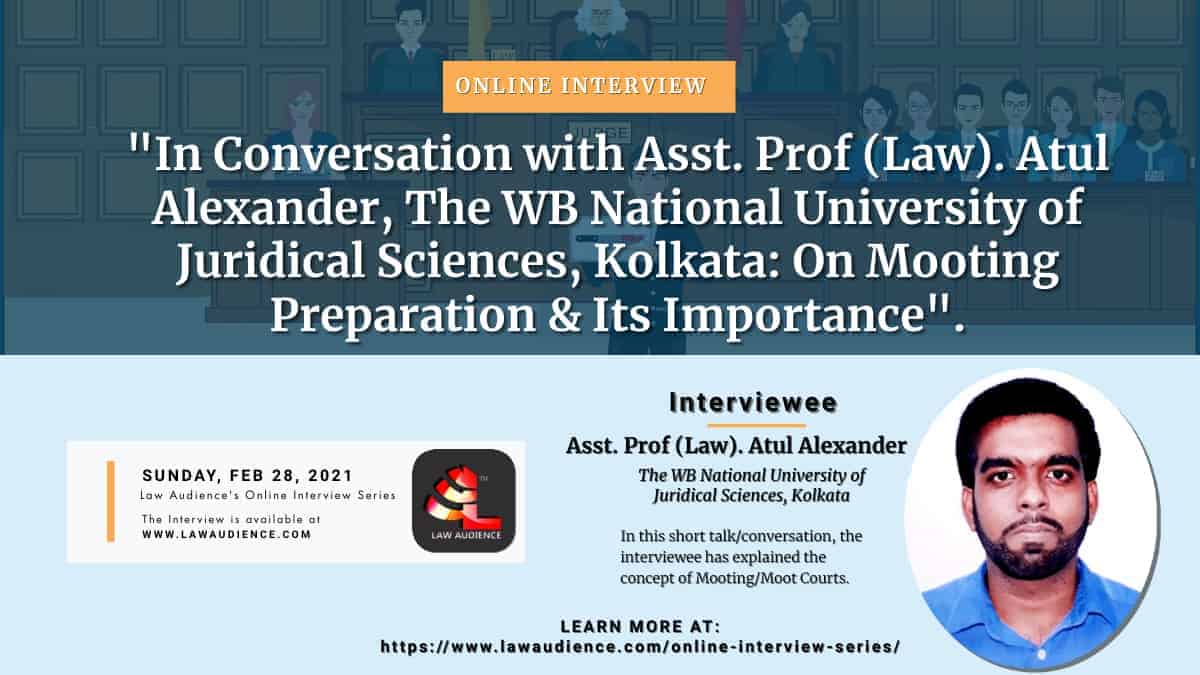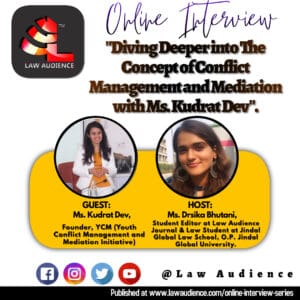Interview Questions:
Question 1: How you would like to introduce yourself to our audience?
Answer: I am Atul Alexander, employed as Assistant Professor (Law) at West Bengal National University of Juridical Sciences, Kolkata.
Question 2: Before we proceed further with this conversation, please explain to our audience that what is Mooting?
Answer: Mooting is stimulated court. In law schools it’s a co-curricular activity which most students take part to learn argumentation and develop legal reasoning.
Question 3: Why Mooting is so much important for Law Students and how it would help them in the future and in which semester they should start participating in the same?
Answer: Mooting is important for every law student for the following reason: a) Sharpen the oratorical skills, b) Enhance legal acumen, c) Develops inter-personal skills, d) Learning to appreciate the depth and contours of law, e) Patience, f) Enhances creativity. There is no specific time frame wherein a student should start mooting however the ideal semester would be the third semester, once the student gets accustomed to the fundamentals of law.
Question 4: After completing the registration process/formalities, how they should start the Mooting Preparation? I mean what would be the best process for the preparation and what points they should keep in mind?
Answer: After registering for a specific moot court competition, Firstly, it is crucial to read the moot proposition several times to understand the nuances of the moot matrix. Secondly, the participants should conceptualize the applicable law and thirdly, apply the law to the facts. The preparation should be done on a stretch i.e., on an average of 3-6 months depending the subject matter of the moot. Also, the participant should do several mock rounds with peers and subject expert to fine-tune the arguments.
Question 5: Please name some must have qualities for the speaker & researcher in Mooting.
Answer: Speaker (Skills)- a) Humility, b) Internalization of law, c) Body language, d) Voice modulation, e) Sticking to the allotted time, f) Plead ignorance (Participants are not except to answer each question).
Researcher (Skills)- a) Extensive Reading, b) Editing the memorials (editorial knowledge), c) Applying facts to the law, d) Co-ordinate with the speakers.
Question 6: According to you, what points they should keep in mind while preparing the ‘memorials’ and while conducting the ‘research-work’ regarding the same?
Answer: a) Extensive footnoting (as it reflects the amount of research), b) Proper proof-reading of the whole memorial, c) Inter-play of law and facts, d) The prayers at the end of the memorial should be precise d) Stick to the page limit, e) Provide index, abbreviation, table of content.
Question 7: As we all know that this Pandemic has brought many changes and ‘virtual moot court’ is one of them. So, according to you, how it is different from physical moot court and does it require any special preparation?
Answer: The pandemic has certainly altered the landscape of mooting, the concept of ‘virtual mooting’ is novel equally to the participant and the judges. Unlike physical mooting virtual mooting stresses on the following, a) More attention to the language of the participants, b) Body language is out of equation, c) less motivation for the participants and the judges.
Question 8: What they should do if the given facts in the moot problem are incomplete or the moot problem is unsatisfactory?
Answer: a) Seek clarification from the organizers, b) Make the point clear to the judges as ‘facts are silent’, c) Interpret the incomplete facts to your advantage. Don’t ever make the grave mistake of fabricating the facts.
Question 9: What they should take along to the moot court competition? Would you like to suggest any checklist?
Answer: Checklists – a) Bare Acts, b) Markers, c) Stick notes, d) Water, f) Compendium.
Question 10: How they should react if the judge or the jury member asks something that’s completely off point?
Answer: The participants should not lose cool. The participants can make a request to defer the answer towards the end of the arguments or plead ignorance. The participants should never attempt to provide a vague or muddled. This might not go very well with the judges.
Question 11: Would you like to highlight anything else relating to the mooting process?
Answer: Moot court is a time consuming process. The participants at the end of the day should focus on enjoying the process rather than the outcome. If the focus is on the process the participants acquire extensive knowledge on the subject matter of the moot, which can be translated as research papers.



